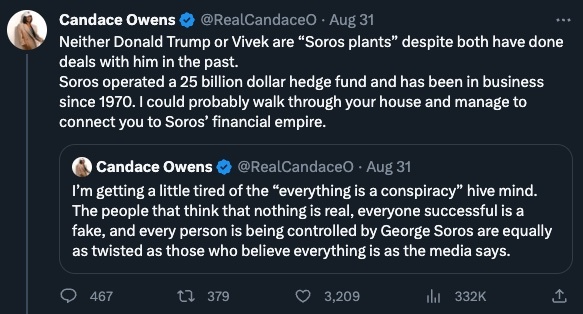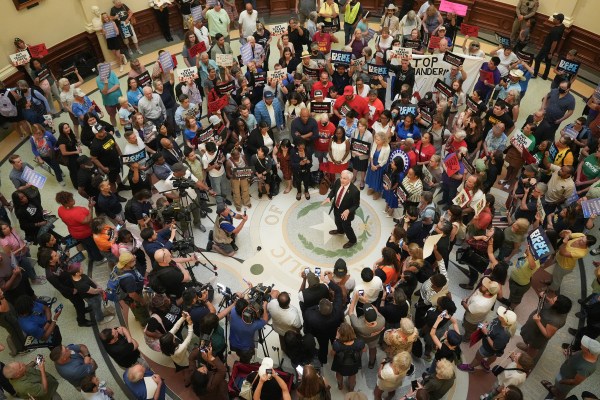There’s a famous tweet from the early days of Trumpmania that’s still cited eight years later whenever some MAGA enabler sounds surprised at what populism has wrought.
The analogy between a demagogic political movement and a wild animal is obvious enough that I’ve used it myself. It’s not just that both are dangerous and won’t ever be tamed. It’s that they’re unpredictable and yet very predictable.
You can’t anticipate what they’ll do moment to moment. But you can rest assured that, eventually, they’ll try to eat your face.
Weirdly, some people who spend an unusual amount of time around feral animals remain in denial about this.
As those of us who’ve seen the film Grizzly Man know, a certain type of animal enthusiast will come to believe that he’s forged a special bond with the objects of his affection. He’s sure that he understands them more deeply than other humans do, so he considers himself at no risk of having his face eaten.
If you haven’t seen Grizzly Man, I’ll leave you to guess how that turns out for him.
I mention all this because the past 24 hours have seen two proud and prominent members of the Leopards Eating People’s Faces Party discovering that their own special bonds with the leopards haven’t removed their faces from the menu.
One is Candace Owens, Daily Wire host, friend of Kanye West, future Republican presidential nominee, and author of drivel like this.
On Thursday, two months after she posted her tribute to America’s most notorious anti-vaxxer, an exasperated Owens complained about the grassroots right’s insatiable appetite for … conspiracy theories.
Hours later, Josh Hammer published an op-ed at Newsweek titled “Republicans, Stop the Self-Defeating Victimology.” Hammer is an outspoken figure of the New Right, the sort of authoritarian prone to grousing on social media about Jonah Goldberg’s fondness for classical liberalism. Today he’s worried that, and I quote, “the American Right is not in a healthy place right now.”
At a certain point, the mentality of victimology becomes self-defeating. And the Right is well past that point. Every problem that conservatives now rightly decry, from a weaponized law enforcement apparatus to a wide-open southern border to a ravaged industrial base in the heartland to the pernicious lies of modern gender ideology, necessarily requires the attainment of political power to possibly solve. Perhaps we can start to reattain power by not coronating an irritable baby boomer with more baggage than the belly of a 747. When it comes to independent and moderate voters, moreover, who among them would wish to cast an affirmative vote for a political movement that loves to bask in the “glory” of defeat?
Of course, none of these thorny calculations are relevant if we don’t want to win. So: Do we?
Scolding populists for relishing their own perceived victimhood and for overindulging in conspiratorial thinking is a bit like scolding leopards for wanting to eat people’s faces. It would be nice if they didn’t want to, certainly. But they wouldn’t be leopards if they didn’t.
And chiding them about it isn’t going to make them lose their appetites.
You might assume that Owens and Hammer spoke up because they’re frustrated by how the GOP’s crop of Senate nominees next year is shaping up. In fairness to Hammer, I suspect that he is frustrated by it; he has choice words in his piece for grifting loser Kari Lake, who’s moving closer to a Senate run, for instance.
Their respective critiques do perfectly capture the folly of nominating and renominating MAGA cranks.
Next year’s Republican Senate primary in Arizona might pit Lake versus Peter Thiel-backed weirdo Blake Masters, if you can believe it. The thought of GOP voters doubling down in a major race on a notorious election denier who lost her last race is absurd; the thought of them having to choose between two election deniers who lost their last races in a contest that might decide control of a chamber of Congress feels like a satire of populism.
It’s so stupid and self-defeating that even commentators who’ve built a career on feeding political enemies to the leopards might find themselves wondering if this whole face-eating thing has gotten out of hand.
The same goes for Montana, where Rep. Matt Rosendale is eyeing a Senate seat. Rosendale is one of those salt-of-the-earth populists who can’t stop running for political office—five different ones (some more than once) in the past 13 years, to be exact. He was the GOP’s nominee for Senate in 2018, two years after Trump won the state by 20 points. He somehow ended up losing to Democratic incumbent Sen. Jon Tester by four points.
As a member of the House, Rosendale voted against certifying Biden’s victory in 2021 (of course) and was one of the 20 Republicans who tried to block Kevin McCarthy from the speakership (of course). The NRSC wants a more electable Senate nominee this time and has settled on newcomer Tim Sheehy, but too bad: Rosendable is currently smoking Sheehy in early Senate primary polling. He wants a rematch with Tester, and Republican voters look poised to give him one.
Next year’s Senate map is so favorable to the GOP that the party almost can’t fail to retake the majority—but if failure is possible, the right-wing base seems intent on finding a way. It would be understandable if Hammer and Owens had recently woken up to that and resolved to urge their audiences to prioritize candidate quality this time.
But I don’t think either of their outbursts this week were motivated by that. I suspect they had to do with Ron DeSantis and the direction of post-Trump populism.
Hammer is a post-liberal ideologue, the sort of literary-class blowhard given to crypto-fascist warnings about “knowing what time it is.” (When Michael Anton eventually hangs it up, Hammer will replace him in the media ecosystem.) In his Newsweek piece, he describes his goal with Orwellian flair as persuading right-wingers to “get more comfortable with a more robust conception of power.” As you might expect, he’s a fan of Ron DeSantis. It’s DeSantis, after all, more so than Trump who’s used executive power to advance an aggressive populist agenda and so it’s DeSantis who’s become the candidate of serious authoritarians.
Trump is a “show horse,” DeSantis is a “work horse.” If you’re intellectually committed to the post-liberal project and keen to abuse state power to punish cultural enemies like Disney, the governor is your man. So imagine Hammer’s dismay at the polling lately showing “an irritable baby boomer with more baggage than the belly of a 747” lapping his favored candidate. And imagine how that dismay might curdle into despair at the thought of Trump defeating DeSantis and then blowing an otherwise winnable general election against Grandpa Joe Biden.
Authoritarian ideologues worry about electability, and rightly so. You can’t wield power against the left if you can’t win power in the first place. And if they’re being honest, away from prying eyes and ears, I suspect they’d lament that Trump’s endless corruption and buffoonery are killing their movement. The less respectable populism becomes to most Americans, the harder it’ll be for populists to recover once Trump is gone.
Candace Owens, on the other hand, is not a great fan of Ron DeSantis.
“There’s just something about him I don’t trust,” she said of the governor back in February. “I love him as the governor of Florida. I’d like to keep him as the governor of Florida. I don’t trust him on the international stage.” In April she grumbled about DeSantis and his wife launching a pre-candidacy diplomatic tour abroad and “acting like they’re JFK and Jackie O.” By late June, she left him for dead politically:
Last week, after the debate, she goofed on him for his “fake smile.”
That’s essential background for her otherwise surprising tweet on Thursday about growing tired of conspiracy theories. In full context, as you’ll see below, it’s clear that Owens isn’t tired of conspiratorial thinking generally. (She considers that “mind yoga.”) What she’s tired of is conspiratorial thinking at the expense of Donald Trump and Vivek Ramaswamy, who just so happen to be Ron DeSantis’ two competitors for populist votes.


Only Owens knows precisely why she favors (or seems to favor) Trump over DeSantis but the passage below from Tim Miller’s recent profile of her is insightful. In some ways, Candace is Trump’s true apprentice on the American right, he argues, because she’s an avatar of cultural resentment more so than a policy wonk. Her form of populism specializes in soft power, not hard.
Trump’s base and listeners of Candace’s podcast care deeply about the dominant American culture. What makes these voters most upset isn’t the regulatory state or any of the nerdy s–t that the Washington political class cares about. They are upset that people like them are no longer the culture’s main characters. They are being displaced by black mermaids, brown Snow White (it’s white there in the name!), and families with two mommies (or daddies). Hell, even their sh—y beer has been co-opted.
…
[S]he can engage the “casuals” while also providing them with a totalizing worldview that rings true but doesn’t feel tied down to policy mumbo-jumbo. It’s a worldview where black celebrities are getting a leg up because of their race. Where cisgendered heteros who just want to have regular missionary sex are being persecuted. Where it’s subversive to be a trad wife who dresses modestly. A world where you can see a straight line from Kardashian culture to the Democratic party to the Instagram model showing off her fake butt to the BLM protester smashing windows in Kenosha.
It turns out that lots of MAGA voters prefer a show horse like Trump to a work horse like DeSantis, believing that “the best way to fight the cultural hegemons is with [a celebrity] who understands how to beat them at their own game,” in Miller’s words. There’s no limit to the denial they’ll engage in for the sake of dismissing practical concerns, like electability, in order to justify their preferences.
Hard-power post-liberals resent the soft-power types’ preference for performative grievance while soft-power post-liberals resent the hard-power types’ perceived inauthenticity. One wing sees populism mainly as a vehicle for politics and governing, the other views it as an organic grassroots cultural backlash. They end up with different priorities and so they begin to pull apart, as was probably inevitable in a competitive presidential primary.
Result: Trump’s leopards have begun to eat the faces of DeSantis supporters like Hammer while DeSantis’ leopards have begun to eat the faces of Trump apologists like Owens.
To right-wing influencers who’ve spent eight years believing, like Grizzly Man, that they’re on the side of the leopards, it must be alarming to suddenly discover that not all of the leopards agree.
But there’s another reason figures like Owens and Hammer are testy about the other wing’s hostility, I think. And this was also inevitable.
Recently a Dispatch colleague and I were discussing Trump’s incentives to run again in 2028 if he loses to Biden next year. Why wouldn’t he, I argued? He’ll have nothing better to do and he’s the last person on earth who’d forfeit the adulation of millions voluntarily. It’s not just that, my colleague replied, it’s the fact that there’s an enormous ecosystem of populist barnacles whose continued relevance depends on Trump’s political relevance. They’ll beg him to keep his grip on the GOP until he heads off to the big courtroom in the sky, purely for their own selfish interests.
Think what would happen if he retires. His top cronies will suddenly be out of jobs, most of them too crankish or obnoxious to catch on with other candidates. Populist stars like Marjorie Taylor Greene will no longer have the king’s ear and will lose juice because of it. Deprived of their meal ticket, the galaxy of Trumpist media propaganda outlets will sweat how to keep the clicks and money coming. One expert on cults recently predicted for The Atlantic that in the post-Trump power struggle, “various pretenders will rise up to claim his mantle and authority, just as the Unification Church splintered into various factions after the death of Reverend Moon.”
Every populist influencer in America will place a bet on which pretender they expect will win the game of thrones, knowing that if they bet correctly they’ll enjoy the favor of the new leader and an unusual degree of access to that person. Whereas those who bet incorrectly risk being frozen out and viewed as a traitor by the right-wing base as allegiances shift, never to regain the stature they enjoyed before.
I feel like we’re getting a taste of that now with Hammer and Owens.
Hammer, the ideologue, placed a bet in the primary on the hard-power candidate—DeSantis—that looks increasingly foolish. Now he’s forced to beg Republican voters to consider electability before his bet goes bust. Owens, meanwhile, bet on Trump fending off DeSantis and retaining his pride of place in the party. She’s adding chips to that bet by scolding some grassroots Republicans for, of all things, being unfair to the cult leader.
An unusually glaring example of populist influencers playing the odds comes from an unusually cynical and mercenary figure, Charlie Kirk. Last year, with DeSantismania rising among the base, Kirk’s Turning Point USA group made the governor a headliner at its events. In February, with DeSantis trailing by just 15 points or so in national polls, news leaked that Trump was furious that his formerly loyal toady Charlie looked poised to leave him for a younger man.
That would have been a very bad bet by Kirk, with lots of money potentially on the line. And so, after Trump got indicted and his lead over DeSantis ballooned, Kirk made amends. A few days ago he attacked DeSantis for not quitting the race immediately and called on him to divert his gigantic super PAC war chest toward helping Trump win the general election. “Donald Trump will be the nominee absent an unforeseen black swan event,” Kirk asserted. “We need that money as a movement right now, and you’re lighting it on fire.”
If the governor stuns everyone by coming back to win Iowa and then the nomination, rest assured that Turning Point will congratulate him effusively for having stayed in the race and bravely fought on. Charlie Kirk didn’t come this far, and get this rich and famous, only to let his face be eaten.
Not yet, anyway. But in the end, everyone gets eaten. (Except maybe Trump.)
Spend enough time with leopards, foolishly believing that you’ve earned their trust, and eventually you’ll do something to make them treat you like prey, as Ron DeSantis and his acolytes are discovering. Misfits, grifters, authoritarians, and bigots: Because a political movement built on cultivating proponents of a feral zeitgeist can’t be domesticated, it also can’t be trusted with power. We tried once and almost got a coup for our trouble. Never again.







Please note that we at The Dispatch hold ourselves, our work, and our commenters to a higher standard than other places on the internet. We welcome comments that foster genuine debate or discussion—including comments critical of us or our work—but responses that include ad hominem attacks on fellow Dispatch members or are intended to stoke fear and anger may be moderated.
With your membership, you only have the ability to comment on The Morning Dispatch articles. Consider upgrading to join the conversation everywhere.